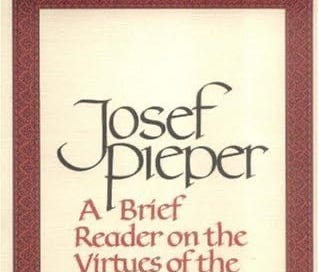If you are looking for the beginning of the study on Josef Pieper’s “A Brief Reader on the Virtues of the Human Heart” then you can go HERE for a brief introduction. At the bottom of the introduction you will find the links to each section of the study guide as it becomes available. If you would like to see the growing list of book studies available for free on this site you can go HERE. Enjoy!
Last Line of Reading Ends: “…a new heaven and a new earth.”
Virtues/Vices/Great Ideas: (Find them in the Text)
Hope, Despair, Happiness
Grammar Questions: (The Information of the Text)
What did Pieper call “the most debated of Aristotle’s tenets?”
What “scarcely examined principle” of the modern age did Pieper draw our attention to?
What are the two sources Pieper gives for the principle referred to above?
According to Pieper, “the Christian inquires after the ordo timoris” so that he learns to fear and not fear what things?
What does man come to understand and affirm through “the virtue of hope?”
What did Pieper describe as “the structure of hope?”
What are “the two forms of hopelessness?”
What can the “natural man” not say as “triumphantly as the Chrsitian?”
What did Pieper say “the contemporary man” has “made a real art of” doing?
What does the term acedia mean according to Pieper?
According to Pieper, what does it mean to celebrate “a feast?”
When does it become “evident whether…hope is authentic?”
What did Pieper say “Christian hope is first and foremost?”
What distinction did Pieper make between the “despairing bravery” of non-Christians versus the “bravery of a Christian?”
Logic Questions: (Interpreting, Comparing/Contrasting, Reasoning)
Aristotle said “tragedy achieves purification” and Thomas Aquinas spoke of the “spiritual gift of fear.” What do these have to do with helping a person become more “pure?”
Why might people of the modern age argue “it is not fitting for man to be afraid?”
Why is the ordo timoris (the order of fear) a critical part of the Christian life?
When Pieper says, “The moral good is nothing else than the continuation and fulfillment of the natural tendencies of our being” what does he mean by this?
Explain Piepers point about man being in statu viatoris (in the state of being on the way) and how it relates to the Christian virtue of hope.
What distinction (or distinctions) is Pieper trying to make between “natural hope” and “supernatural hope” and why is it important?
In what way are “despair” and “presumption” opposite forms of hopelessness?
Why did Pieper say a person in despair “can appear to be a thoroughgoing optimist?” How is it that they can do this?
Pieper said “laziness” is often the word we choose for translating the Greek word ἀκηδία (transliterated “acedia”). In light of his definition of acedia, why is “laziness” an insufficient translation?
How does Pieper’s brief discussion of the concept of celebrating feasts fit into the stream of what he is discussing concerning hope?
When Pieper discusses the notion of the “heroic downfall” what does he mean by this and what makes it fundamentally different from the Chrsitian notion of bravery due to hope?
Rhetoric Questions: (The Analysis of Ideas in the Text)
When most people use the word “hope” today in an average conversation, what do they mean by it? How is this usage of the term hope substantially different from the concept of “Christian hope” as has been discussed in this present reading? Give an example of a situation where Christian hope is particularly called for.
Give an example of a story which illustrates well the idea of the “heroic downfall” described by Pieper. What about that story fits the mold of a heroic downfall? How do you personally feel when you read/hear/watch a story that presents this picture of despair and defiance? Do you think stories which portray this idea are helpful or harmful to the good of society? Explain your reasoning about this.
Theological Analysis: (Sola Scriptura)
Read Romans 4:13-25. How does this passage illustrate the Christian notion of hope in contrast to the concept of merely “natural hope?”
Read 1 Kings 2 and the story of the end of Joab. Do you think Joab’s actions in his last moment constitute an act of hope? Why or why not?
Read 1 Corinthians 15:12-26 and 1 Thessalonians 4:13-18. What does the Christian doctrine of the resurrection have to do with the virtue of hope?



